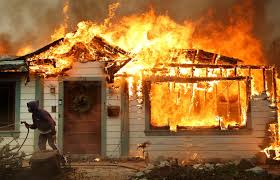Note: If you wish to receive, via e-mail, (1) my weekly newsletter or (2) daily copies of these posts, write to me at [email protected]. Comments may also be sent to this address. I promise not to share your e-mail with anyone. To unsubscribe, write here as well.
Monday
When it comes to horrific disasters like the California fires, one can focus on the big picture, like I did in Thursday’s post, or one can zero in on individual tragedies, as I do today. Applying Raymond Chandler’s Red Wind to the fires led me to focus on the corruption that has contributed to them since social rot is at the basis of hard-boiled detective fiction. The noir crime novels of the 1930s were fueled by the Great Depression’s devastating impact on urban life and the rise of organized crime in response to prohibition. The genre resonates with us today because we have our own corruption, what with the fossil fuel industry and flunky politicians willing to sacrifice the planet for their own gain.
At the same time, on a more personal level we are witnessing heart-rending tragedies as people see their houses and all their possessions go up in smoke. They can therefore related to the sorrow of Puritan poet Anne Bradstreet upon seeing her own home burn down.
Verses upon the Burning of Our House, July 10th, 1666
Here Follows Some Verses Upon the Burning
of Our house, July 10th. 1666. Copied Out of
a Loose Paper.
In silent night when rest I took,
For sorrow near I did not look,
I wakened was with thund’ring noise
And piteous shrieks of dreadful voice.
That fearful sound of “fire” and “fire,”
Let no man know is my Desire.
I, starting up, the light did spy,
And to my God my heart did cry
To straighten me in my Distress
And not to leave me succourless.
Then, coming out, behold a space
The flame consume my dwelling place.
And when I could no longer look,
I blest His name that gave and took,
That laid my goods now in the dust.
Yea, so it was, and so ‘twas just.
It was his own, it was not mine,
Far be it that I should repine;
He might of all justly bereft
But yet sufficient for us left.
When by the ruins oft I past
My sorrowing eyes aside did cast
And here and there the places spy
Where oft I sate and long did lie.
Here stood that trunk, and there that chest,
There lay that store I counted best.
My pleasant things in ashes lie
And them behold no more shall I.
Under thy roof no guest shall sit,
Nor at thy Table eat a bit.
No pleasant talk shall ‘ere be told
Nor things recounted done of old.
No Candle e’er shall shine in Thee,
Nor bridegroom‘s voice e’er heard shall be.
In silence ever shalt thou lie,
Adieu, Adieu, all’s vanity.
Then straight I ‘gin my heart to chide,
And did thy wealth on earth abide?
Didst fix thy hope on mould’ring dust?
The arm of flesh didst make thy trust?
Raise up thy thoughts above the sky
That dunghill mists away may fly.
Thou hast a house on high erect
Frameed by that mighty Architect,
With glory richly furnished,
Stands permanent though this be fled.
It‘s purchased and paid for too
By Him who hath enough to do.
A price so vast as is unknown,
Yet by His gift is made thine own;
There‘s wealth enough, I need no more,
Farewell, my pelf, farewell, my store.
The world no longer let me love,
My hope and treasure lies above.
While Bradstreet is attempting to find consolation in her faith—what are worldly possessions compared to the celestial mansion that awaits?—I’m struck by how intimately she describes what she has lost. Some of the objects are infused with memory: “And here and there the places spy/Where oft I sate and long did lie.” Other points to communal fellowship–“Under thy roof no guest shall sit,/ Nor at thy Table eat a bit”—and to sacred rituals such as weddings–“Nor bridegroom‘s voice e’er heard shall be.”
Side note: This last regret brings to mind the line from Yeats’s “Prayer for My Daughter”: “And may her bridegroom bring her to a house/ Where all’s accustomed, ceremonious.” Here too the house is more than a house.
After expressing her deep sadness, Bradstreet chides herself for placing so much value in earthly possessions. “All’s vanity,” she says, quoting Ecclesiastes, and then, “Didst fix thy hope on mould’ring dust?/ The arm of flesh didst make thy trust?” I suspect many of the California wildfire victims will not find comfort in such a vision and perhaps Bradstreet herself isn’t entirely convinced. But they at least have in the poet someone else who feels their pain.
Further note: My friend and colleague John Gatta, an Anne Bradstreet expert, writes in to mention one loss she did not mention:
Once reading further into the background of the house fire that Bradstreet describes, I was struck to learn that it also wiped out the unusually ample (for this time and place) book collection that the Bradstreets had gathered for themselves out in the wilderness. They considered these books, as you can well imagine, to be a precious link to the Old World Culture that had formed their personal identities. And they could surely not hope to replace them quickly or easily with an order sent to Amazon!


